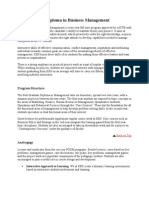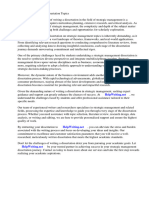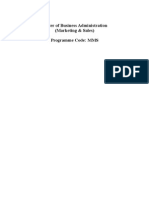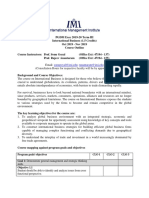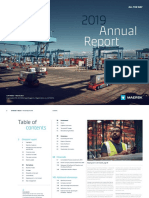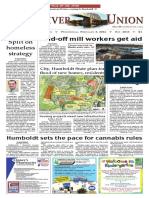Information Brochure: Master's Degree Programmes, 2011-2013 25
Information Brochure: Master's Degree Programmes, 2011-2013 25
Uploaded by
Ashish RebornCopyright:
Available Formats
Information Brochure: Master's Degree Programmes, 2011-2013 25
Information Brochure: Master's Degree Programmes, 2011-2013 25
Uploaded by
Ashish RebornOriginal Title
Copyright
Available Formats
Share this document
Did you find this document useful?
Is this content inappropriate?
Copyright:
Available Formats
Information Brochure: Master's Degree Programmes, 2011-2013 25
Information Brochure: Master's Degree Programmes, 2011-2013 25
Uploaded by
Ashish RebornCopyright:
Available Formats
Information Brochure: Masters Degree Programmes, 20112013 Semester Course No Course Title Industrial Relations and Trade Unions
Strategies in a Global GL 7 Economy GL 9 Organising Informal Labour GL 11 Research Methodology II GL 12 Leadership Development (Compulsory, NonCredit) World Trade Organisation, World Bank and the International GL 13 Monetary Fund Trade Union Students (6 months) III Internship Regular Students (3.5 months) Trade Union Students Dissertation Regular Students GL 16 Indian Labour Law IV GL 17 Corporate Social Responsibility and Social Audit GL 18 Governance and Public Policy GL 19 Advanced Writing Skills Note: GL 16, GL 17, GL 18 and GL 19 are only for the regular students
25
Credits 4 4 4 4 16 8 16 8 2 2 2 2
3.6
M.A. HUMAN RESOURCES MANAGEMENT AND LABOUR RELATIONS
The M.A. Human Resources Management and Labour Relations programme (HRM & LR) (and formerly known as M.A. Personnel Management and Industrial Relations) is designed to develop students into professionally competent and socially sensitive management graduates, fully equipped to take on the challenges of the corporate world. This programme presents an outstanding prospect to explore the critical areas of contemporary human resources management, in concert with a comprehensive knowledge and understanding of the key functions of management and business. The broad objectives of this programme are to sensitise students to the social, political, economic, and ecological environments of the society; to enable students to become effective business leaders and decision-makers to contribute to organisational effectiveness; to facilitate the use of systems thinking among the students to evolve possibilities, while addressing various personal and organisational challenges; to develop a global perspective among students to respond to global challenges; and to impart values of intellectual honesty, justice and fairness. Responding to the changes in the external environment, a futuristic orientation and in consonance with the mission of the Institute, this M.A. HRM & LR has undergone a major restructuring of its curriculum. The programme places importance on both theoretical and hands-on learning. While classroom learning through participation in discussions, case study analysis, presentations, simulation games, assignments, etc., emphasises conceptual clarity, practical inputs are provided through the rigorous field work system, which complements the classroom inputs by throwing light on the practical dimension of the profession. The insights that emerge out of such an experience make students conceptually strong and successful in the practice of the profession. Field work is a continuous process, which seeks to facilitate students
26
Information Brochure: Masters Degree Programmes, 20112013
exposure to varied industry sectors. Students also undertake internships with organisations for a period ranging from 68 weeks, which is seen as an opportunity for the student to learn significantly from, and contribute meaningfully to organisations. In brief, the M.A. HRM & LR programme, which benefits from over 4 decades of teaching and research in the same area, is a challenging teachinglearning experience that blends cutting edge theory with innovative practice to develop business leaders for the global industry. The TISS HRM & LR postgraduates are amongst the most sought after in global industry today. They occupy positions of leadership across a wide spectrum of industries and sectors including, IT/ITeS, banking and finance, telecom, manufacturing, public sector, pharmaceutical, retail and management consultancy. Distribution of Credit Hours
Year First Detail Courses (Compulsory) Field Work Courses (Compulsory) Credit s 32 12 16 12 10 6 88
Field Work Optional Courses (spanning across both First and Second years) Research Project TOTAL
Second
Notes: Research project is compulsory and equivalent to 6 credit hours (i.e., 3 courses). Students can opt for any 5 optional courses from the basket of 10 courses, distributed across 4 semesters. The credits are only indicative and may change.
Semester-Wise Listing of Courses
Semester Course No. Title of the Courses PC 1 PC 2 FC 1 FC 2 I FC 3 FC HR 1 FC HR 2 FC HR 3 HR 1 HR 2 Interaction with HR Heads (Part of Induction) Round Table Discussion on FW followed by Industrial visits (Part of Field Work) Understanding Society Introduction to Basic Economics Development Experience, State, Social Conflict and Change Sociology of Organisation, Organisation Theory and Design Management of Human Resources: Conceptual and Strategic Perspectives Industrial Relations and Trade Unionism Social Research & Case Analysis Employment Law I Credits 2 2 2 2 2 2 2 2
Information Brochure: Masters Degree Programmes, 20112013 Semester Course No. Title of the Courses HR 3* I HR 4* PC 3 HR 5 HR 6 HR 7 HR 8 II HR 9 HR 10 HR 11 HR 12 PC 4 HR 13 HR 14 HR 15 HR 16 HR 17 III HR 18 HR 19 HR 20* HR 21* HR 22* PC 5 HR 23 HR 24* IV HR 25* HR 26* HR 27* HR 28* Business Environment Business Communication and Presentation Skills Understanding Self and Facilitating Relationship (in the form of personal growth laboratory) (Compulsory and non-evaluative) Organisation Behaviour I Performance Management and Development Learning and Development Business Statistics and Quantitative Techniques Compensation Management Employee Resourcing Marketing and Sales Management Operations Management Development Centre (Compulsory and non-evaluative) Organisation Development and Change Management Application of IT in HRM Employment Law II Labour Economics: Theory and Practice Employee Wellness, Decent Work and SHE Organisation Behaviour II Financial Accounting & Cost Management Conflict Management and Negotiation Skills Training Process, Delivery and Effectiveness Measurement Advanced Compensation and Benefit Assessment Centre: Conceptualisation and Implementation (Compulsory and non-evaluative) Corporate Governance and Business Ethics Business Strategy and Strategic Human Resources Management Human Resource Management in International Settings Gender and Diversity Management Talent Management Leadership
27
Credits 2 2 2 2 2 2 2 2 2 2 2 2 2 2 2 2 2 2 2 2 2 2 2 2 2 2
(PC: Professional Context; FC: Foundation Course; * Optional Courses) Notes: Total credit hours for the programme, including field work, are 88. PC 1 and PC 2 form part of Induction to the programme. Compulsory courses comprise 48 credit hours. Summer project is non-credit and compulsory. The semester-wise listing of courses is provisional and may change.
You might also like
- Dashboard SmartFx Hub 2Document1 pageDashboard SmartFx Hub 2david mofokengNo ratings yet
- Syllabus Corso Strategia 2020-21Document7 pagesSyllabus Corso Strategia 2020-21Enri GjondrekajNo ratings yet
- Public Service Values On Patriotism Towards Public Service Excellence - Atty Alexander L LacsonDocument128 pagesPublic Service Values On Patriotism Towards Public Service Excellence - Atty Alexander L LacsonVoltaire M. BernalNo ratings yet
- MBA (Dual Specialization) Programme Code: MGB: Duration - 2 Years Full TimeDocument38 pagesMBA (Dual Specialization) Programme Code: MGB: Duration - 2 Years Full TimeDev GuptaNo ratings yet
- Annexure 'M': Syllabus Business Studies (Code No. 054) Class - XII (2013-2014) RationaleDocument20 pagesAnnexure 'M': Syllabus Business Studies (Code No. 054) Class - XII (2013-2014) RationalevichmegaNo ratings yet
- Course OutlineDocument9 pagesCourse OutlineShahriar ShuvoNo ratings yet
- Post Graduate Diploma in Business Management: Program StructureDocument5 pagesPost Graduate Diploma in Business Management: Program StructureShakshi89No ratings yet
- IV Trimester MarketingDocument24 pagesIV Trimester MarketingRahul AroraNo ratings yet
- Annexure 'M': Syllabus Business Studies (Code No. 054) Class - XII (2013-2014) RationaleDocument5 pagesAnnexure 'M': Syllabus Business Studies (Code No. 054) Class - XII (2013-2014) RationaleYashBahetiNo ratings yet
- 18es51 NotesDocument72 pages18es51 NotesDipthi NNo ratings yet
- Principles of Management OutlineDocument8 pagesPrinciples of Management OutlineakyNo ratings yet
- Placement Brochure MBA & PGDM - 2014-15 PDFDocument28 pagesPlacement Brochure MBA & PGDM - 2014-15 PDFDanishNo ratings yet
- BMG935 IHRM ModuleHandbookDocument8 pagesBMG935 IHRM ModuleHandbookNayomi Ramawickrama Samarakkodi100% (1)
- 743 Lesson Plan - Bba-302 (BPS)Document7 pages743 Lesson Plan - Bba-302 (BPS)Harsh SaxenaNo ratings yet
- MBA-Business Sustainability 2012Document8 pagesMBA-Business Sustainability 2012Dinakar PeriNo ratings yet
- Graduate Cou IonsDocument20 pagesGraduate Cou IonsMrigendra MishraNo ratings yet
- PMIRDocument124 pagesPMIRhashvishuNo ratings yet
- Ahore Chool OF Conomics: Strategic Management (MGT-401)Document10 pagesAhore Chool OF Conomics: Strategic Management (MGT-401)Duaa AsjadNo ratings yet
- Module Summaries Advanced LevelDocument18 pagesModule Summaries Advanced LevelNurali PanjwaniNo ratings yet
- 9 - MBA Course Outline 2014-15Document222 pages9 - MBA Course Outline 2014-15Dr-Shefali GargNo ratings yet
- Course Catalog - MBADocument8 pagesCourse Catalog - MBA-Madusha Umayanga-No ratings yet
- Dba Course WordDocument4 pagesDba Course Wordshamini.k.uumNo ratings yet
- MBA II - HRM - MBDS5015 UpdatedDocument4 pagesMBA II - HRM - MBDS5015 Updatedraju kumarNo ratings yet
- Course Outline Strategic Management UpdatedDocument13 pagesCourse Outline Strategic Management Updatedvani3826No ratings yet
- Sila BusDocument19 pagesSila BusTry DharsanaNo ratings yet
- Mba Program Overview 2010Document9 pagesMba Program Overview 2010Anand BakshiNo ratings yet
- Department of Banking & Finance Government College University, FaisalabadDocument4 pagesDepartment of Banking & Finance Government College University, FaisalabadMohammad Sohail RashidNo ratings yet
- 2015 BCom Hons 2015 SemSysSyllabus 030615Document38 pages2015 BCom Hons 2015 SemSysSyllabus 030615kalpesh deora100% (2)
- Placement Brochure FMS MBA 2012Document28 pagesPlacement Brochure FMS MBA 2012webiisNo ratings yet
- IIM B GMITE-Course Contents PDFDocument8 pagesIIM B GMITE-Course Contents PDFananndNo ratings yet
- Strategic Management Dissertation TopicsDocument8 pagesStrategic Management Dissertation TopicsBuyCheapPapersOnlineFortWayne100% (1)
- Business Analysis Strategic Management Structure 2016Document4 pagesBusiness Analysis Strategic Management Structure 2016Bogasi Q.No ratings yet
- Course Outline: International Islamic University MalaysiaDocument7 pagesCourse Outline: International Islamic University MalaysiaakbmashNo ratings yet
- Mgt201 Syllabus EeeDocument7 pagesMgt201 Syllabus Eeeankit25594No ratings yet
- BBA 4year Termsystem PDFDocument44 pagesBBA 4year Termsystem PDFMuhammad SaadNo ratings yet
- SM Course Outline (Fall 2020)Document5 pagesSM Course Outline (Fall 2020)nakashNo ratings yet
- Bba 2023-26Document77 pagesBba 2023-26bewakoof461No ratings yet
- Master of Business Administration (Marketing & Sales) Programme Code: MMSDocument36 pagesMaster of Business Administration (Marketing & Sales) Programme Code: MMSHomework PingNo ratings yet
- Sasin HRMDocument12 pagesSasin HRMChris LeeNo ratings yet
- I605 Fall 2022 Course OutlineDocument13 pagesI605 Fall 2022 Course OutlineParm KoonerNo ratings yet
- Industrial Management Beyond The SyllabusDocument17 pagesIndustrial Management Beyond The SyllabusPrem Swarup100% (1)
- Scheme and Syllabus-MBADocument74 pagesScheme and Syllabus-MBAPankaj KumarNo ratings yet
- Assignment Brief (A1) - GBEDocument4 pagesAssignment Brief (A1) - GBEBích Nhật NguyễnNo ratings yet
- Knowledge and Human Capital As Sustainable Competitive Advantage in Human Resource Management2019Sustainability SwitzerlandDocument18 pagesKnowledge and Human Capital As Sustainable Competitive Advantage in Human Resource Management2019Sustainability SwitzerlandMary RodchenkoNo ratings yet
- BS Program Four-YearDocument27 pagesBS Program Four-YearAsghar KhanNo ratings yet
- Syllabus 3rd SemDocument28 pagesSyllabus 3rd SemSaurabh SinghNo ratings yet
- Thesis Topics in Asset ManagementDocument5 pagesThesis Topics in Asset ManagementBuySchoolPapersOnlineLowell100% (2)
- School - of - Management - 2023 10 26 17 7 51Document9 pagesSchool - of - Management - 2023 10 26 17 7 51a7310286No ratings yet
- Research Report On EmployabilityDocument17 pagesResearch Report On EmployabilityFizza KhanNo ratings yet
- SUMMARIESDocument4 pagesSUMMARIESRyan PilapilNo ratings yet
- A Review of Balanced Scorecard Framework in Higher Education Institution (Heis)Document10 pagesA Review of Balanced Scorecard Framework in Higher Education Institution (Heis)GabrielGarciaOrjuelaNo ratings yet
- Indian School of BusinessDocument14 pagesIndian School of Businessapi-19517492No ratings yet
- CIPD Level 5 Intermediate Diploma in Human Resource ManagementDocument4 pagesCIPD Level 5 Intermediate Diploma in Human Resource ManagementMbaStudent56No ratings yet
- International Business2019 PDFDocument4 pagesInternational Business2019 PDFPRIYA RAJNo ratings yet
- BrunelDocument5 pagesBrunelJAGDEEP KAURNo ratings yet
- Hanisha Shamnani CP ProjectDocument32 pagesHanisha Shamnani CP ProjectHanishaNo ratings yet
- Mahamaya Technicaluniversity,: Syllabus For First Year of Master of Business Administration (Mba)Document34 pagesMahamaya Technicaluniversity,: Syllabus For First Year of Master of Business Administration (Mba)Nupur Agarwal JainNo ratings yet
- Middle Managers in Program and Project Portfolio ManagementFrom EverandMiddle Managers in Program and Project Portfolio ManagementNo ratings yet
- Building an entrepreneurial culture from the strategic modelingFrom EverandBuilding an entrepreneurial culture from the strategic modelingNo ratings yet
- Using the Project Management Maturity Model: Strategic Planning for Project ManagementFrom EverandUsing the Project Management Maturity Model: Strategic Planning for Project ManagementRating: 4 out of 5 stars4/5 (1)
- Fundamentals of Accountancy, Business and Management 1 (Q3W5&6)Document7 pagesFundamentals of Accountancy, Business and Management 1 (Q3W5&6)tsukiNo ratings yet
- Charlotte-Mecklenburg State of Housing Instability & Homelessness ReportDocument110 pagesCharlotte-Mecklenburg State of Housing Instability & Homelessness ReportWCNC DigitalNo ratings yet
- Name: Shahroz Ali Reg# 2183150: Human Resource Management Laws in PakistanDocument3 pagesName: Shahroz Ali Reg# 2183150: Human Resource Management Laws in Pakistanshahroze ALINo ratings yet
- Umar Farooq - FM AssignmentDocument5 pagesUmar Farooq - FM AssignmentUmar GondalNo ratings yet
- Topic 4 Yield Measures and The Yield Curves: FINA 4120 - Fixed Income 1Document73 pagesTopic 4 Yield Measures and The Yield Curves: FINA 4120 - Fixed Income 1MingyanNo ratings yet
- Chapter 4 Writing Business PlanDocument16 pagesChapter 4 Writing Business PlanMuhammad AfzalNo ratings yet
- Institutions, Institutional Change and Economic PerformanceDocument23 pagesInstitutions, Institutional Change and Economic PerformanceHugo Serafini100% (1)
- Sectioning Grade 11Document47 pagesSectioning Grade 11TRISTANE ERIC SUMANDENo ratings yet
- Maersk Annual Report 2019Document152 pagesMaersk Annual Report 2019Eric LopesNo ratings yet
- 2020 Sustainable Agriculture Standard Farm Requirements Rainforest AllianceDocument86 pages2020 Sustainable Agriculture Standard Farm Requirements Rainforest AllianceSofia MontañezNo ratings yet
- Demystifying TaxesDocument15 pagesDemystifying TaxesFelix Rogers JesudassNo ratings yet
- ElectricityToday - Jul 27 2023Document8 pagesElectricityToday - Jul 27 2023jonazakNo ratings yet
- UNIT3Document13 pagesUNIT3Md. SunmunNo ratings yet
- Principles of Marketing CW2Document5 pagesPrinciples of Marketing CW2kitderoger_391648570No ratings yet
- ACCA Support Resources SBL 2023Document2 pagesACCA Support Resources SBL 2023monima mahatoNo ratings yet
- (CFA) (2015) (L2) V11 - 2015CFA二级基础班 - 固定收益 - 粱震宇1Document188 pages(CFA) (2015) (L2) V11 - 2015CFA二级基础班 - 固定收益 - 粱震宇1Phyllis YenNo ratings yet
- Export - Import Cycle - 18 May-2023Document51 pagesExport - Import Cycle - 18 May-2023Garvit AgarwalNo ratings yet
- Sdoc 05 30 SiDocument18 pagesSdoc 05 30 Sijabulile.mhlengiNo ratings yet
- Urban Housing PresentationDocument27 pagesUrban Housing PresentationRitesh Kumar Patro0% (1)
- Actuary India April 2014Document28 pagesActuary India April 2014daredevil2926No ratings yet
- Australian Sharemarket: TablesDocument21 pagesAustralian Sharemarket: TablesallegreNo ratings yet
- ND Special Funds - Performance Audit ReportDocument28 pagesND Special Funds - Performance Audit ReportRob PortNo ratings yet
- MadRiverUnion 2 3 16editionDocument14 pagesMadRiverUnion 2 3 16editionMad River UnionNo ratings yet
- DuplicateBill Jul 2024 0400022562841Document2 pagesDuplicateBill Jul 2024 0400022562841jamesyum.jy1No ratings yet
- BECG Reckoner MBA GTU PDFDocument115 pagesBECG Reckoner MBA GTU PDFpoojaNo ratings yet
- Pricing Strategies: Marketing Starter: Chapter 11Document28 pagesPricing Strategies: Marketing Starter: Chapter 11muazNo ratings yet
- Telephone Sep 2022Document4 pagesTelephone Sep 2022shyamyeoleNo ratings yet
- Quality Engineering Quality Engineering ( (ME17307 ME17307) ) : Dr. S. B. MishraDocument8 pagesQuality Engineering Quality Engineering ( (ME17307 ME17307) ) : Dr. S. B. MishraAutomax MNNITNo ratings yet






